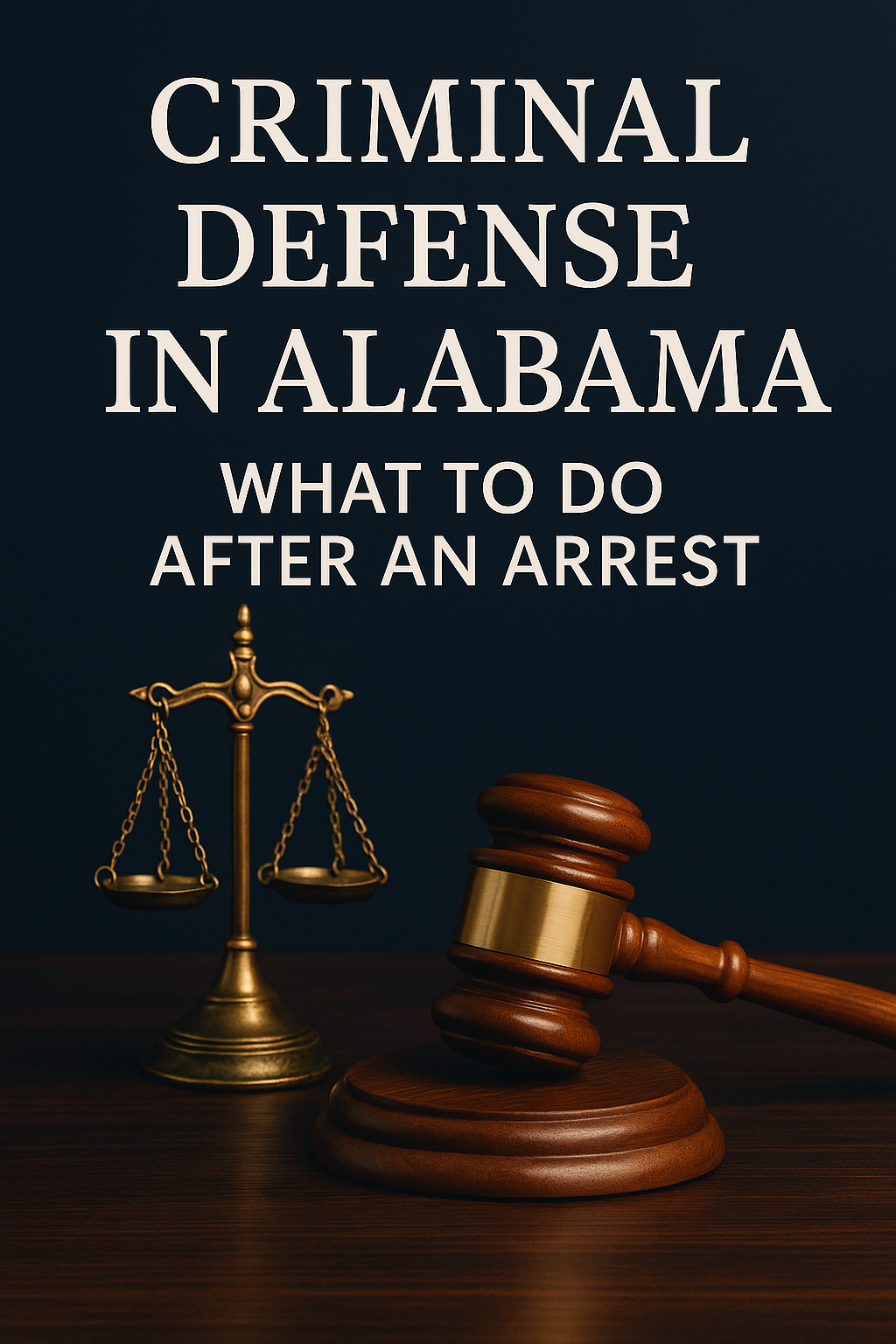Criminal Defense in Alabama: What to Do After an Arrest
If you’ve been arrested or charged with a crime in Alabama, your next steps in the criminal defense process are critical. Understanding your rights, the court process, and how a defense attorney can assist you can make a major difference in how your case is resolved.
This article provides a clear, actionable guide for anyone facing criminal charges in Alabama — from misdemeanors to serious felonies.
You’ll learn:
- What happens immediately after an arrest
- Common types of criminal charges in Alabama
- How the legal process unfolds
- Your constitutional rights
- How a criminal defense attorney can help protect those rights
What Is a Criminal Charge in Alabama?
A criminal charge is a formal accusation by the State of Alabama that a person violated a criminal law.
Crimes are generally classified as:
- Violations: Minor offenses, usually resulting in fines.
- Misdemeanors: Less serious crimes with possible jail time up to one year.
- Felonies: Serious offenses that may carry prison sentences over one year.
Definition Box: Felony vs. Misdemeanor in Alabama
| Type | Example | Possible Penalty |
| Misdemeanor | Disorderly conduct, DUI, petty theft | Jail (≤ 1 year), fines up to $6,000 |
| Felony | Burglary, assault, drug trafficking | Prison (> 1 year), higher fines, probation |
What Happens After an Arrest in Alabama?
The legal process generally follows these steps:
- Arrest and Booking
You’ll be taken into custody, photographed, and fingerprinted. - Initial Appearance
Within 48–72 hours, you appear before a judge who sets bail and informs you of the charges. - Arraignment
You enter a plea: guilty, not guilty, or no contest. - Pretrial Hearings and Motions
Both sides exchange evidence. Your attorney can challenge unlawful searches, arrests, or confessions. - Trial or Plea Negotiation
Many cases are resolved before trial through plea discussions. - Sentencing and Appeals
If convicted, sentencing follows Alabama guidelines; appeals may be possible for legal errors.
Common Criminal Charges in Alabama
- DUI (Driving Under the Influence)
Alabama law (Ala. Code §32-5A-191) prohibits operating a vehicle with a BAC of 0.08% or higher.
Penalties may include fines, jail time, license suspension, and mandatory ignition interlock devices.
- Drug Possession or Distribution
Possession of controlled substances can be charged as a misdemeanor or felony depending on quantity and intent.
- Theft and Property Crimes
Theft is classified by value stolen:
- Under $500: misdemeanor
- Over $500: felony (Theft of Property 2nd or 1st Degree)
- Assault and Domestic Violence
These cases are taken seriously and often involve protective orders or no-contact provisions.
- Probation Violations
Failing to meet probation terms can lead to revocation and potential jail time.
Your Rights Under Alabama Criminal Law
According to the U.S. Constitution and the Alabama Constitution, you have specific rights that protect you at every stage of a criminal case:
- Right to remain silent — You are not required to answer police questions.
- Right to an attorney — You may request one before any questioning.
- Right to due process — You must be treated fairly under the law.
- Right to a trial — You may challenge the charges in court.
“Invoking your right to remain silent and to have an attorney present is the most important first step after an arrest.”
When to Contact a Criminal Defense Attorney in Alabama
You should contact an attorney as soon as you know you’re under investigation or immediately after arrest.
A defense lawyer can:
- Review your arrest for legal errors.
- Protect your constitutional rights.
- Negotiate for reduced charges or alternative sentencing.
- Represent you in all court proceedings.
Legal guidance can help ensure your case is handled according to Alabama law and procedural rules.
Step-by-Step: What to Do If You’re Arrested in Alabama
- Stay Calm and Compliant — Avoid arguing or resisting.
- Do Not Discuss the Case — Anything you say can be used against you.
- Ask for an Attorney Immediately.
- Avoid Social Media Posts — Prosecutors can use them as evidence.
- Document Everything — Dates, times, and officer names can matter later.
Related Questions About Alabama Criminal Defense
Can My Charges Be Reduced or Dismissed?
Yes. Many cases can be negotiated to lesser offenses, depending on evidence, first-time status, and other factors.
What Is a Plea Bargain?
It’s an agreement where the defendant pleads guilty to a lesser charge in exchange for reduced penalties.
Will a Criminal Conviction Stay on My Record Forever?
Not always. Some offenses may qualify for expungement under Alabama law, allowing the record to be sealed.
Common Mistakes Defendants Make
- Talking to police without a lawyer present
- Missing court dates or failing to follow bond conditions
- Posting about the case online
- Assuming “minor” charges have no long-term impact
Even a misdemeanor conviction can affect employment, housing, and licensing.
Authority Tip: Alabama Criminal Statistics
According to the Alabama Criminal Justice Information Center (ACJIC):
- Over 170,000 criminal cases are filed annually statewide.
- The majority involve misdemeanor offenses.
- Representation during pretrial stages significantly improves case outcomes.
Conclusion: Protect Your Rights and Future
Key Takeaways:
- Contact an attorney immediately after arrest.
- You have the right to remain silent and to counsel.
- A legal defense can help reduce charges and protect your record.
- Early action often leads to better outcomes.
Next Step:
If you’ve been charged with a crime in Alabama, contact Tim Fleming Law today for a consultation. We’ll review your case and help you understand your legal options.







